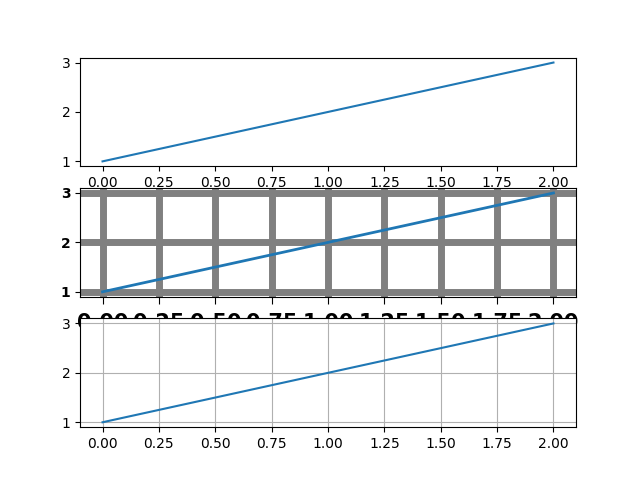Note
Go to the end to download the full example code
Customize Rc#
I'm not trying to make a good-looking figure here, but just to show
some examples of customizing rcParams on the fly.
If you like to work interactively, and need to create different sets of defaults for figures (e.g., one set of defaults for publication, one set for interactive exploration), you may want to define some functions in a custom module that set the defaults, e.g.,:
def set_pub():
rcParams.update({
"font.weight": "bold", # bold fonts
"tick.labelsize": 15, # large tick labels
"lines.linewidth": 1, # thick lines
"lines.color": "k", # black lines
"grid.color": "0.5", # gray gridlines
"grid.linestyle": "-", # solid gridlines
"grid.linewidth": 0.5, # thin gridlines
"savefig.dpi": 300, # higher resolution output.
})
Then as you are working interactively, you just need to do:
>>> set_pub()
>>> plot([1, 2, 3])
>>> savefig('myfig')
>>> rcdefaults() # restore the defaults

import matplotlib.pyplot as plt
plt.subplot(311)
plt.plot([1, 2, 3])
# the axes attributes need to be set before the call to subplot
plt.rcParams.update({
"font.weight": "bold",
"xtick.major.size": 5,
"xtick.major.pad": 7,
"xtick.labelsize": 15,
"grid.color": "0.5",
"grid.linestyle": "-",
"grid.linewidth": 5,
"lines.linewidth": 2,
"lines.color": "g",
})
plt.subplot(312)
plt.plot([1, 2, 3])
plt.grid(True)
plt.rcdefaults()
plt.subplot(313)
plt.plot([1, 2, 3])
plt.grid(True)
plt.show()